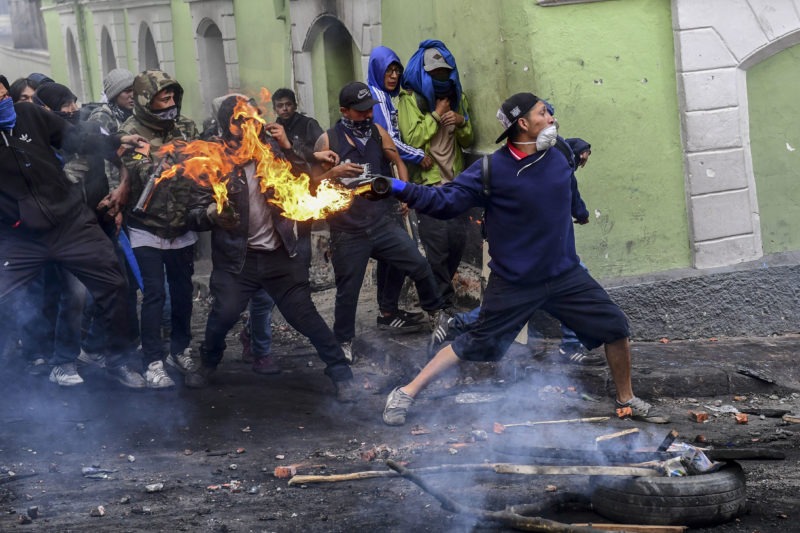Ecuador’s Moreno seeks talks after week of fuel hike protests
Demonstrators clash with riot police in Quito. The protestors are demanding the president reinstate fuel subsidies which were cut last week (Martin BERNETTI)
Quito (AFP) – Ecuador’s President Lenin Moreno will Thursday try to resume dialogue with the indigenous community after a week of protests against fuel price hikes which have escalated into violent clashes and disrupted the country’s oil output.
“Without a doubt, this is going to be solved very soon,” an optimistic Moreno said in a video broadcast on state television following clashes Wednesday between protestors and security forces in Quito which left several injured.
Moreno moved the seat of government to the southwest port city of Guayaquil on Monday following violent protests in the capital of the small South American country.
He returned briefly to Quito Wednesday as thousands of people representing indigenous groups, farmers, students and labor unions marched in the city, with clashes erupting between protestors and police.
The protesters are demanding that Moreno reinstate fuel subsidies that were rescinded last week after $4.2 billion in loans was agreed with the IMF.
“I came to Quito to reach out and to announce that we already have good results as regards dialogue,” Moreno said, before heading back to Guayaquil in the evening.
Contacts have been established between the government and the demonstrators, mediated by the United Nations and the Catholic Church.
– ‘It has not ended’ –
But despite the president’s optimism, indigenous leader Salvador Quishpe said the “demonstration is ongoing, it has not ended.”
And Jaime Vargas, one of the leaders of the powerful indigenous umbrella organization CONAIE, was reluctant to talk to a “government that has succumbed to pressure from the International Monetary Fund.”
Discussions with CONAIE leaders also took place in Guayaquil.
“There is dialogue with the brother indigenous peoples who unfortunately have needs,” Moreno said of the groups which make up a quarter of the population of the country’s 17.3 million people.
He also offered to free up resources for those hit hard by the rise in fuel prices.
The demonstrations broke out after increases of up to 120 percent in fuel prices came into force on October 3.
They have left one civilian dead and 122 people injured, with 766 detained, according to the latest figures from the authorities and the Red Cross.
The unrest has threatened to inflict wider damage on an already weakened economy.
– Oil industry hit –
The energy ministry announced Wednesday it was shutting down one of the country’s two domestic oil pipelines, effectively suspending two-thirds of its distribution of crude.
“Due to this shutdown, we are analyzing the possibility of declaring force majeure,” to avoid the country incurring penalties for postponing crude shipments, the ministry said in a statement.
Protesters seized three oil facilities in the Amazon earlier this week.
Ecuador, which exited the OPEC international oil cartel last week citing economic constraints, produced more than 500,000 barrels-per-day (bpd) — which was worth some $4.6 billion in exports in the first six months of the year.
However, Wednesday’s shutdown accounts for 68 percent of its oil output, the ministry said, adding that the protests had cost $12.8 million in lost production to date.
Moreno, who still claims to be a socialist, has received unexpected support from the right and the army over the unrest.
In Guayaquil, a stronghold of the business community, thousands demonstrated Wednesday in support of the president.
“The measures are harsh, but they should have been done by the government of Rafael Correa. Now we must let the president continue,” said Geovanni Molina, a 68-year-old retiree.
Moreno has accused his predecessor and ex-ally Correa along with Venezuelan President Nicolas Maduro of an “attempted coup d’etat” using the indigenous population
“The evidence points precisely to him (Correa) as a key player,” Moreno insisted in an interview with CNN Wednesday.
Maduro, a leftist firebrand whom Washington is seeking to oust, has denounced allegations of involvement as absurd.
Moreno has drawn support, however, from seven Latin American countries — including Argentina, Brazil and Colombia — that, in a joint statement, rejected any effort by Maduro and his allies to “destabilize” Ecuador.
Disclaimer: Validity of the above story is for 7 Days from original date of publishing. Source: AFP.


